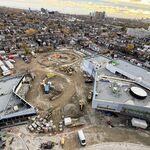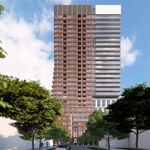Some cities in Europe (and some cities in NA - such as Boston) exhibit this characteristic, but others don't. I certainly don't think Berlin is lacking in dynamism. And there's plenty of other similarly lively places, both in the western and eastern parts of Europe.
Though perhaps Boston is not as lively as New York, I certainly would not consider it quotidian.
Air pollution must have done in most major asian cities (although a few from Japan snuck in). In my limited experience they have vastly superior transportation systems (subway, commuter rail, bus) then North American cities, have virtually zero crime when compared to N.A., have quality schools and good, affordable access to healthcare. Not to mention the countless supermarkets and street vendors selling every kind of fruit and veggie imaginable, there's several on every block it seems.
If those are the measures taken by the survey they I would have to say that a number of large asian cities must destroy Toronto (Japanese, South Korean, Chinese, Singapore etc) except for the sometimes nasty air.
I always find these surveys quite funny.
While I also agree that these surveys are always biased or pointless in one way or another, given the criteria they are based on (stability, environment, factors that tend to point towards a life that is less stressful and "hectic"), I can certainly see why a lot of the Asian cities don't make it to the top of these lists. These Asian cities are fast-paced, high-stressed, cutthroat societies, and Japan, Korea and HK have by far some of the highest suicide rates in the world. HK and Singapore also have among the highest discrepancy between the rich and the poor, worse than even the US and rivalling many of the African and Latin American developing nations.
I don't know about Korea, but HK and Japan are notorious for their crazy housing prices. In HK, a 20/30-year old condo unit in the outer urban core sells for $5000-10000 HKD / sqft (about $750-1500 CAD), and having to pay $4M ($600K CAD) for a 600 sqft unit is pretty much standard. Even for rentals, you have to pay at least $20-25 HKD / sqft ($3-4 CAD) for something decent, like $10K ($1500 CAD) for a 500 sqft unit in the outer urban core, and that doesn't even include utilities. Even a 50 sqft compartment in a 60-yr old apartment that is divided into multiple units with shared bathroom and kitchen can cost as much as $4000 HKD in rent. Certainly not the most "liveable" situation, especially when the average office worker only earns $10-15K a month. And oh, don't forget that Korea and Taiwan's minimum wage is less than $4 CAD, Japan has a slightly more decent $7 (but for Tokyo's cost of living), and HK and Singapore don't even have min wage.
Censorship and human rights issues are very significant in many of these cities, especially Singapore where the governing party has and still imprisons dissidents and sues opposition parties into bankruptcy. HK also doesn't have true democracy or universal suffrage, and large-scale demonstrations are commonplace (so much so that HK had been branded the "Demonstrations Capital of Asia"), with the most significant one being the annual 7/1 demonstrations which attract between 50-500k people (this can certainly be seen as an exercise of democratic rights, but only because actual democratic electoral rights are lacking). Large-scale, violent student demonstrations are also commonplace in Seoul and only became less frequent in recent years. Being in a dormant (S Korea vs N Korea) or perceived (Singapore vs Malaysia) state of war and with mandatory, multiyear military conscription that doesn't allow for conscientious objection also probably don't contribute very favourably to a "liveable" society.
Interesting point about education too. The intense competitiveness and cutthroat nature of education in HK and Japan is legendary. As well, educators throughout Asia had long criticized their own education systems as "Peking-duck style" or "force-feeding" education, where information and "knowledge" is shoved down students' throats and critical thinking skills are never cultivated. It's not a surprise why many East Asian parents send their kids to high schools and universities in North America and Australia, but rarely the other way.
As for healthcare, HK neither has universal healthcare, nor is even health insurance a common practice, let alone being provided by employers. Healthcare is "good" in that if you are sick the quality of the care is comparable to western nations, but you better hope you don't get really sick because you can hardly afford it. Wait-time and overcapacity is also as serious a problem in most major East Asian cities as here.




